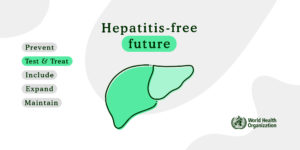The 28th of July is World Hepatitis Day. Viral hepatitis B and C affect 325 million people worldwide causing 1.4 million deaths a year. Hepatitis B and C are the second most fatal infectious diseases after tuberculosis, and 9 times more people are infected with hepatitis than HIV.
Hepatitis is preventable, treatable, and in the case of hepatitis C, curable. However, over 80% of people living with hepatitis are lacking prevention, testing and treatment services. World Hepatitis Day is an opportunity to step up national and international efforts against hepatitis, encourage action and engagement by individuals, partners and the public, and highlight the need for a greater global response. Low rates of testing and insufficient/inadequate treatment need to be addressed in order to achieve the goal of eliminating these diseases globally by 2030.
AFEW International is uniquely positioned as one of the few HIV, TB, hepatitis and sexual and reproductive health and rights organisations working in Eastern Europe and Central Asia. AFEW improves access to health services for key populations at risk for HIV, TB and viral hepatitis. A specific group within the key populations at risk for viral hepatitis are people who use drugs. Although major gaps in epidemiological data exist, HCV prevalence reportedly ranges from 70–95% amongst people who inject drugs (PWID) and 18 to 80% for people living with HIV (PLHIV)[i] in the EECA region. Therefore, AFEW continues to advocate for the need in EECA countries to ensure HCV surveillance and the availability of direct-acting antiviral medications at affordable prices, in order to expand treatment and prevent the continued transmission of the infection.
AFEW’s vision is of a world in which vulnerable groups in society have access to healthcare without stigma or discrimination.




